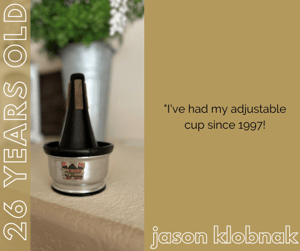Quick Fixes for Common Brass Instrument Performance Issues


Everybody wants a quick fix to their playing issue, but do they exist? The safe answer is no. You must work diligently every day to establish good playing habits and learn your music. But what if you are doing that and there are still issues? Here are some thoughts that might be the quick fix to your problem.
1. Is Your Sound Off?
Take a quick look down your mouthpiece shank and lead pipe. Build up in these areas will definitely affect how open your sound feels and sounds. If there is a lot of disgusting build up, this is probably a good indication you should give your axe a bath.
2. Take Your Time.
If you are going to clean your horn because it has gotten to the unmentionable state, then take your time doing it. A quick rinse in the sink is not going to do it. Get the right snakes and brushes, soak, and scrub. Rinse and repeat if needed. Grease everything when you are done, and then take it for a ride. You will not be disappointed.
3. Valve guides.
These are plastic on most horns and they do wear down which can affect your valve alignment and can also lead to a sticking valve. New valve guides may be the quick fix to some technique issues.
4. Change Your Valve Pads.
And while we are on the subject of valves, how old are your valve pads? Valve pads wear down, and can wear unevenly at that. Old valve pads can cause a ton of problems, from noise to how well certain notes will speak.
Get our newest tips, updates, videos, clinics, community events, and more by joining Denis Wick Tips Blog
5. New Cork/Springs.
As your spit valve cork wears down it can cause leaks which can affect tone and response. A weak or loose spit valve spring can do the same. New cork/springs can provide a quick focus to your sound if your old corks were leaking.
6. Invest in a Practice Mute.
If things feel out of balance, like you are extending more effort and getting less response from your chops, get your hands on a Denis Wick Practice mute. Originally called a practicing tool, this mute was designed to open your sound by balancing the relationship between your air and embouchure. This has been a quick fix for my tired, injured and unbalanced chops on many an occasion.
7. Discover Tension in Your Body.
Gripping your horn tightly while you play can slow down your fingers as well as clench your muscles that should be hitting all those high and low notes. This may not be a quick fix, but in some cases when you know where the tension is, you can concentrate on relaxing that area and quickly remove whatever was blocking your technique or range.
8. Are You Having Issues with Range?
Depending on weather, pressure systems, or what groups/people you are playing with at the moment, your center of pitch can be influenced for the worse. Then when you are on your own again, you sit down to practice and all of a sudden nothing sounds or responds right. Pull out your tuner and see where your center of pitch is landing. Check not just the notes that are giving you a problem, but more importantly the notes leading toward them. Re-centering yourself can sometimes be the quick fix to many note issues.

Is your mute older than ours? Visit our Denis Wick Artist Group Oldest Mute Gallery to view our collection and submit an image of your own mute, or story of your favorite dent, to be added to our gallery.

Find all our Denis Wick resources in one spot on the Denis Wick app. Download to view videos, clinics, educator resources, podcasts, product information & more!



